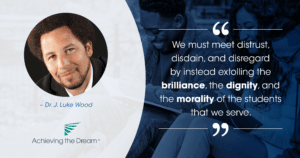Last week, Achieving the Dream hosted the Equity in Teaching and Learning institute, a two-day virtual convening for college educators and leaders to engage in professional learning with new tools to center equity in their teaching and learning practices. Participants from over 80 colleges were joined by 60 presenters from 30 colleges and partner organizations.
In her opening remarks, ATD’s president and CEO Dr. Karen A. Stout recognized the challenges, trauma, and hard work that has gone into the past year — from a pandemic that has uprooted the educational system to a nationwide reckoning on racial justice. Dr. Stout told participants, “My hope is that you can look at these next two days as part of self-care… to reconnect with your sense of purpose.
Pursuing equity through transformation
From inspiring plenary sessions led by nationally recognized keynote speakers to laser-focused spotlight sessions and concurrent workshops, purpose was exactly what Institute participants connected with throughout the event.
Dr. Bettina L. Love, award-winning author and the Athletic Association Endowed Professor at the University of Georgia, gave the opening plenary address entitled “We Gon’ Be Alright, But That Ain’t Alright: Abolitionist Teaching and the Pursuit of Educational Freedom.” Diving into the racist, traumatic history of education in America, she discussed the challenges and possibilities of committing to abolitionist goals to move beyond what she calls the education survival complex. “I should be here to live my full life,” Dr. Love said. “It is not Black people’s job to fight racism. We do this because we want to do more than survive.”
She encouraged participants, particularly white participants, to advocate for equity in education by being co-conspirators, rather than just allies: Co-conspirators engage in the challenging work of abolition and rebuilding even if—and especially when—it is inconvenient or uncomfortable.
Faculty, students, and college leaders as partners in learning
Following the plenary, the Institute broke out into concurrent sessions. In “Student Insights on Abolitionist Teaching,” participants heard from five college students, who are all engaged with ATD as student fellows in the Every Learner Everywhere network. Vickiana Supriana shared that racism in education often turned her classroom into a battlefield, and Barbara Gooch discussed her son’s challenges as a first-generation college student in a rural area.
In a workshop on equity-minded leadership, Dallas College provost Dr. Shawnda Floyd was in conversation with ATD’s vice president of network engagement Dr. Monica Trent and director of equity initiatives Francesca Carpenter. Dr. Floyd stressed the importance of starting and maintaining conversations around equity-mindedness in the classroom. “This should be something that as leaders we discuss on a daily basis,” she said.
Friday sessions included discussions around the essential role of professional learning in advancing equity, race-conscious learning, and institutional transformation. In a spotlight session entitled “Decentering Whiteness,” H. Ray Keith and James Gray of the Community College of Aurora invited participants to look critically at how assumptions around culture and race may influence their teaching practices.
Faculty from Miami Dade College and LaGuardia Community College, as well as ATD staff and coaches, made a case for the importance and benefits of high-impact professional learning. Speakers highlighted the New Learning Compact Framework and ATD’s Teaching & Learning Toolkit as key resources to support institutional transformation around equity in teaching and learning. Starting this summer, ATD will introduce a new professional learning seminar that will support college teams with coaching and peer learning as they leverage these resources to build a culture of equity-focused teaching and learning excellence.
Steps toward change
The closing plenary session featured keynote speaker Dr. Luke Wood, vice president of student affairs & campus diversity and Dean’s Distinguished Professor of Education at San Diego State University. Dr. Wood is also co-director of the Community College Equity Assessment Lab. In his address, “Employing Culturally Affirming and Equity-Minded Teaching and Learning Practices to Advance Institutional Equity,” Dr. Wood addressed the specific ways in which students of color can experience racism in the classroom and discussed concrete strategies for dismantling inequity. He laid out principles of equity-minded teaching and learning with the “five B’s”:
- Be intrusive
- Be relational
- Be culturally relevant and affirming
- Be community-focused
- Be race-conscious
The role that faculty and leaders can and should play in increasing equity on campus is vital. As Dr. Wood said, “An inequity in one system serves to amplify inequities in other systems.” By taking the principles and strategies shared during the Equity in Teaching and Learning Institute, educators can implement changes in their classrooms and across their institutions that make college an accessible, equitable, and supportive space for all students.
In his closing remarks to conclude the Institute, Director of Teaching & Learning Jon Iuzzini said, “Let’s continue to keep our students front and center as we think about what our teaching will look like in the transition to the next normal in the coming months. Let us be the co-conspirators that Dr. Bettina Love urged us to be.”

